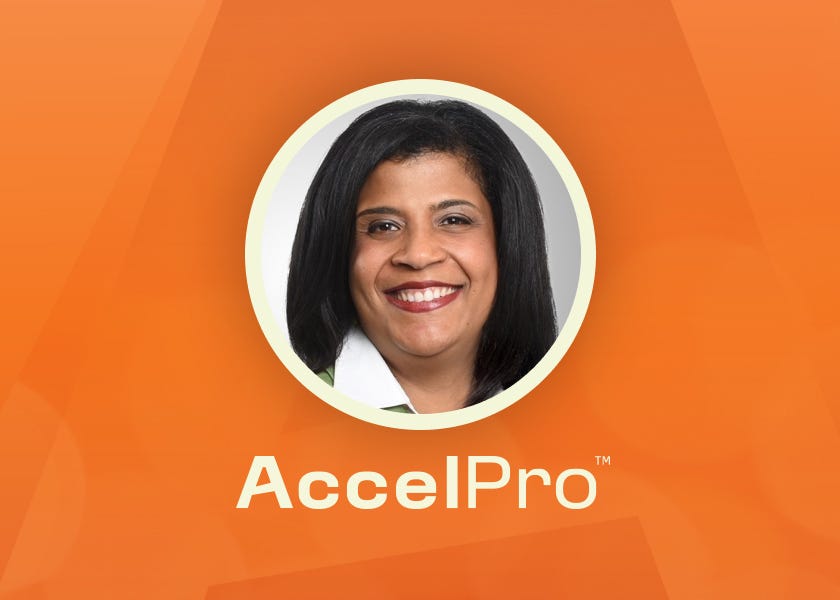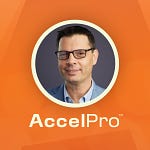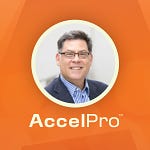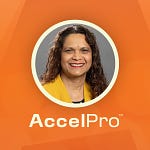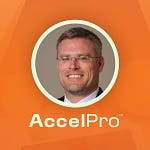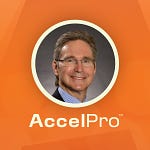Listen on Apple Podcasts, Spotify and YouTube
Welcome to AccelPro Audit, where we provide expert interviews and coaching to accelerate your professional development. Today we’re featuring a conversation with Guylaine Saint Juste, the CEO of the National Association of Black Accountants.
Saint Juste is former banking executive at Capital One, where she oversaw small business strategy and led various aspects of business banking, including talent acquisition, performance management, marketing and sales. She was also an Executive Director at Year Up, a non-profit organization that helps develop talent and provide opportunities for promising young adults.
In her words, Saint Juste joined the NABA “to create a platform that will educate, empower and mobilize Black business and accounting professionals to ensure equitable representation at all levels of the continuum of the career ladder.”
“There's plenty of talent in this country. But we're not engaging with it,” Saint Juste explains. “When firms told me that because of macroeconomic pressure, that they wouldn't spend the $30, $40, $50 thousand dollars that we asked them to pay to have access to this pipeline, and therefore didn't show up, that, for me, continues to permeate this conversation that we have about talent.”
Listen on Apple Podcasts, Spotify and YouTube
Interview References:
Guylaine Saint Juste’s National Association of Black Accountants, Inc profile.
3:57 | Guylaine Saint Juste, SHRM-SCP, CAE – 2023 Most Powerful Women in Accounting. (6 June, 2023). CPA Practice Advisor.
5:28 | Saint Juste, Guylaine and Reisig, Rick. Accounting Leaders Divided Over Changing 150-Hour Rule for CPAs. (27 September, 2023). Bloomberg Tax.
5:28 | Saint Juste, Guylaine. Why the CPA qualification’s 150-hour college credit rule is outdated–and inequitable. (14 July, 2023). Fortune.
TRANSCRIPT
Alizah Salario, Host: I want to start by talking about your role as the CEO of NABA, the National Association of Black Accountants. This organization does an extraordinary amount of work to ensure equity across the spectrum of accounting and auditing, and you are at the helm. Tell us a little bit about what drew you to this role.
Guylaine Saint Juste: Our vision is a more just world. The way in which we envision this justice movement is that we want to create partnerships with platforms such as yours that will ultimately bring together Black business leaders and institutions. We talk about our allies, our advocates, and our accomplices that actually enhance and elevate and empower Black business leaders and institutions to achieve the best version of themselves.
There are three different layers to our work, and each one of them is complex in and of itself. One is we have a direct service component to our work. We offer programs, networking events and connection opportunities. The second is about systems change. We look at what works and what doesn't work in the system, and how do we challenge the status quo, offer tweaks, advice, etcetera, that make the system more encompassing and therefore more just.
Then the third layer is movement building. There's a lot happening across this country and around the world, where we each in our own way might pause and say, have we all lost our mind? I love this quote that I recently read: “The more advanced we become in knowledge, even pushing into artificial intelligence, it appears to me at least that we become less wise.” We are building a movement that would ask really hard and tough questions, that propels people into action, that ultimately will drive to a more just world.
AS: You said, “Instead of being merely nice, prioritize being kind, thoughtful and honest about the unspoken rules to foster a more supportive and welcoming environment for women.” I want to know what those unspoken rules are, and how women can not only get into the field, but ascend and thrive as auditors and accountants.
GSJ: Alizah, thank you for doing your research so thoroughly. I think in this culture, we've become addicted to being nice. And I'm not nice. I don't want to be nice. The more I grow, the more I realize that nice is not the solution. I will tell you why my number one core value is truth. I think healing happens from truth, justice happens from truth, prosperity happens from truth, the knowing of thyself and then the knowing of others is where magic happens. So I just think that what people ought to focus on, and what I focus on myself, is the practice of kindness. If I'm going to have to be nice and tell you something that, quite frankly, I think you need to hear, I'm going to choose to be kind and loving and tell you the truth that I think will benefit you, without being a jerk.
AS: All of those things that you've just mentioned do a lot of work toward creating psychological safety. I want to hone in on the systems change aspect of your work, and look at some of the barriers to entry in the field, particularly leading to lower representation among African-American professional auditors. For example, I know you've written about the 150-hour credit rule for the CPA exams. How can we remove some of those barriers to entry to create more diversity in the field?
GSJ: People confuse the concept of lowering the barrier of entry with lowering our standards, and our expectations of excellence and integrity and ethics in this profession. The two are not the same. We're not advocating for a lowering of our standard, and the knowledge and the ethics that we want our auditors to have. Sometimes people confuse auditors with fact-checkers, and do not recognize that auditors give safety. I’m talking about psychological safety to capital markets.
It is because an audit is published, and that I become aware of it, and that I can trust the proxy statements that allow me to decide if I want to invest my hard-earned money in a company so that I can have whatever prosperity looks like—for me it’s to be able to ensure generational wealth for my generations to come. The reality of it is that 42 percent of audits now are being found with flaws in them. The question in movement building is, did we achieve our desired outcomes? In systems change, let us lean in, in truth, but truth in loving kindness to say [that] we knew that when some of those decisions were made, the knowledge that we now have of the disparate effects of some of the system issues have on certain communities.
Let's own it. And then let's say, together, what is the path forward? We are not against the extra 30 credit hours. What we are simply saying is, it could be a path. People who are coming with the richness and a vibrancy of propositions and — I've written extensively about this in Bloomberg, in Fortune, etcetera — we cannot continue to say it's one way or the highway. We're going to stick ourselves into a position when we have plenty of evidence that it doesn't work, it is not getting us to the desired outcome.
Now, we understand also it's hard to change. And we're going to continue to push for the right conversations to ask the tough questions and expect that the people who hold the power are going to be willing to bring us as equal partners to have meaningful conversations on how we craft the way forward.
AS: So let's talk a little bit about that way forward. I want to focus on some of the key traits that individuals in the accounting and audit pipeline should have in order to excel in the field and build that public trust.
GSJ: We talked a lot about how we teach Fundamentals. We start with credit and debit. So people learn the tactical before they actually understand how that fits into the broader picture. And so for me, I applied this into your question to say, do auditors really understand the importance of what they do? When folks tell me that this generation wants to have purpose and meaning, holy cow! Do we help people understand that they are responsible for the market society that we know works? We know market societies work. They work better than other alternatives. However, there is a sense of security that all of us have to have in the data that is presented to us, and that auditors are responsible for providing, which is why NABA went into accounting, not just as a profession, as a field.
AS: You've spoken before about how the audit profession is a public service. I'd love for you to dig deeper, especially considering that the talent pipeline among 18 to 34 year olds is not exactly what we would like it to be right now, according to recent data.
GSJ: We had an experience recently that really caused me to pause and look at the state of the pipeline. So for two of our regional conferences, NABA ended up sponsoring in excess of a thousand people. We had, maybe, across the two, 18 companies that showed up to support and meet those young people. We've intentionally reached out to community colleges, schools that usually people don't think about. And we had so many young people who said, I'm so thankful you've opened my eyes to a world I didn't know. This was my first time on a plane. This is my first time staying in a hotel, and the whole nine yards.
I'm not an auditor, but always brings a fair level of skepticism to conversations. So do we really have a pipeline problem, or do we have a systems problem? There's plenty of talent in this country, but we're not engaging with it. When firms told me that because of macroeconomic pressure, that they wouldn't spend the $30, $40, $50 thousand dollars that we asked them to pay to have access to this pipeline, and therefore didn't show up, that, for me, continues to permeate this conversation that we have about talent.
How do we connect talent with opportunity? You've got a massive number of people and schools that for whatever reason, are underfunded or don’t have the opportunity to participate. So we had a thousand people that would not have come to a regional conference had NABA not made the decision to live its mission and pay for them to come, right?
AS: That brings up a really interesting point. You're talking about this gap between talent and opportunity, and I would be remiss if I didn't ask you about the role of academic institutions. How might they expand certification or career pathways for candidates to bridge that gap and meet some of the evolving requirements in the field
GSJ: Again, I'm going to continue to ask the tough question. I don't know that that's what academic institutions were orchestrated for in this country. All of a sudden, it's either we have an academic-led market, or we have a business-led market, full stop, period. That's why this American experience of the best self-government system known to human history is still a fact in this country, despite the frailties that are emerging. The market is boss. The job of academia is to prepare the talent to enter the market. Is the talent there? We could argue either way. For me, that's why NABA exists. We invite academic institutions to come and partner with us.
We're making some bold decisions to say, if a student wants to be a member of NABA, we're not going to exclude them because of their membership fee. But NABA cannot do that alone. Businesses and the market that says it's in need of that talent to satisfy their customer has to be willing to invest — and to invest meaningfully and sustainably.
Multiple different pieces with NABA being the key, like the hub that brings all the spokes together, to solve a problem for a group of people that this country needs to agree, because of the systems that have been put in place, have been marginalized. Just because they've been marginalized, it doesn't mean that they're not there. And it does not mean that they're not talented.
AS: I want to switch gears, and I'd like to talk about your own professional career. You spent 25 years in the financial service industry, and I want to know what in your experience prompted some of the wisdom and the many lessons that you're sharing with us today.
GSJ: First of all, thank you for naming that. I'm offering wisdom and insight. I'm so honored to hear that. And if that's the energy that people capture, it fuels me to continue to do the work that we're trying to do. I had a unique experience and a unique journey in financial services in that I have a name nobody can say. I'm almost six feet tall. You put a couple of inches on me, I'm taller than a lot of men. I am not a small person by any stretch of the imagination.
I speak with an accent and then, oh my gosh, the travesty of it all — I have strong opinions about things that matter to me and to those I seek to serve! So you can imagine that was not a recipe for success in a field that is traditionally white and very conservative. And then I started my journey as an immigrant to this country who speaks English as a third language in community colleges. I don't have a four year degree. I have a seven-year degree because I had to work to put myself through school. It took me seven years to achieve my bachelor's, thanks to a transfer agreement between Northern Virginia Community College and George Mason University. I'm the first in my family to go to college.
Nothing is wasted, nothing is lost, it's all recycled. Every moment in your journey, if you choose to live awake, and live consciously, life is constantly talking to you. Like the moments when people would talk (as if I wasn't in the room) about only recruiting from the best schools. I never made it to the best schools, and my alma maters, I thought they were awesome schools. The notion that folks should only go to 25 top schools when there are 8,000 colleges and universities in this country—do you see how the mentality of scarcity continues to permeate? The funny thing is, I outperformed who was supposed to be the best all the time.
And then at a point in my life, I hit a wall and I decided, you know what? I don't want to continue to fight or try to affect change when the multiple layers of myself that I just shared with you and your audience are considered baggage, as opposed to really interesting pieces—perspective, talent and stuff that can achieve results.
That's when I left and went to Europe, and boy, did I learn a lot. I'm deeply grateful to Gerald Chertavian, because I learned a lot about European systems, about how things work in this country from a different viewpoint looking in.
AS: What's so interesting to me about the way you framed your past is that — to keep in line with economic language —you talked about scarcity. Despite messages from other people, it sounds as though you really had a mentality of abundance about all that you brought to the table. So what I want to know is who helped you along the way, and what peers do you turn to now when you need mentorship or direction?
GSJ: Never, ever give up on your wildest dream and your wildest expectations. I had the pleasure of spending some time with Kwasi Mitchell, the Chief Purpose Officer at Deloitte, and he shared an anecdote about when he studied in Kenya. In our cultures, Haiti, Kenya, the roads don't have names. And so people will say, ‘Oh, it's right around the corner.’ Right around a corner could be 30 minutes, five minutes or two hours.
Kwasi had gone to the mother where he stayed and asked directions and said, ‘It's around the corner? Is it an hour? Is it 15 minutes?’ And she said, “Why does it matter? Why don't you get going?” It’s the idea of taking the first step, moving into motion. Being still is different than being inactive. Take the first step. Do something about it. Apply for a job, pick up the phone, call somebody, become a NABA member.
I want people to find their own voice, which is why we're very intentional at NABA. We say the best version of oneself at every point of the journey, because I'm an evolving creature. The idea is listening to what life is telling you and then taking the first step, then the next 10, then the next hundred — you will live a life that is more massively adventurous and intriguing, that has more questions than answers, than you could ever have imagined.
This AccelPro audio transcript has been edited and organized for clarity. This interview was recorded on October 31, 2023.
Listen on Apple Podcasts, Spotify and YouTube
AccelPro’s expert interviews and coaching accelerate your professional development. Our mission is to improve your day-to-day job performance and make your career goals achievable.
Send your comments and career questions to questions@joinaccelpro.com. You can also call us at 614-642-2235.
If your colleagues in any sector of the audit field might be interested, please let them know about AccelPro. As our community grows, it grows more useful for its members.




